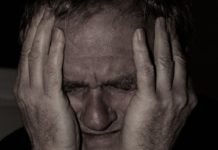Is a Little Stigma Better Than None?
An anti-anti-stigma campaign
The whole anti-stigma campaign is something of a joke. Google the word “stigma,” see for yourself. Mental health labels are inherently stigmatizing,...
Death Grip: Then and Now
From what I’ve learned, it seems that the minute you walk into a psychiatrist’s office or have the misfortune to be locked up on a ward is the minute you’re given a diagnosis and medication(s), and perhaps even electroshock. There is no “normal”; “normal” is not allowed. You have a “lifelong disorder” of whatever ilk, and it must always be medicated. This is the paradigm.
Who and What Killed Prince and Michael Jackson? Will the Role of Benzos Ever...
It is the deadly cocktail of benzodiazepines and opiates that is most responsible for the rising rate of opiate overdose deaths... and benzos may actually be THE decisive deadly component in the lethal drug combination. Yes, fentanyl and propofol can be dangerous drugs, but to focus the main attention in this crisis on these rarely used drugs is deliberately misleading...This minimizes the critical role of benzos and rather conveniently lets certain institutions and their leaders off the hook as the main suspects in such a vast number of cases that should be labeled as crimes of negligent homicide.
Can Education Level Predict Prescription Drug Misuse in Young Adults?
A new study examines the extent to which patterns in prescription drug misuse and substance use disorder symptoms can be predicted by education level
Don’t Harm Them Twice: When the Language Surrounding Benzodiazepines Adds Insult to Injury (Part...
Language is important. And when language dictates specific treatment protocols, it should be used with extreme scrutiny. Using the wrong words can put vulnerable people at risk—not only to their sense of self-worth, their sense of self-knowledge, and they way they are treated, but also to their health.
On the Other Side
It was the first time in my Klonopin journey it occurred to me the problem might not be inherent in me. The problem might actually be the Klonopin. Convinced my very life was at stake, I made the firm decision to get off the stuff once and for all.
Polypharmacy Poisoning, Dependence and Recovery from the Psychiatric Paradigm
It took surviving all of the symptoms of benzodiazepine withdrawal, including derealization, gastritis, auditory hallucinations, wasting, dementia, panic attacks and profound depression, for me to come to understand that not only had I really been a cool person before all that shit, but also that nothing was wrong with me. I was smart and a little neurotic at times, but that was it. Drugs caused me to be mentally ill where I had not been before.
Update: Massachusetts Benzodiazepine Bill Hearing
The hearing for Bill H4062: Informed Consent for Benzodiazepines and Non-benzodiazepine Hypnotics took place on Monday – in the middle of an April snowstorm! The discussion clarified some important points in the legislation and gave survivors an opportunity to tell their stories. I was so proud to be there and witness the courage, camaraderie, resilience, advocacy, and vulnerability of fellow survivors. This legislation is our chance to be heard. As one survivor said, through tears, to the committee, “Do not let my suffering be in vain. I beg you to pass this bill.”
Sweeping Benzos Under the Carpet
Being an ex-accountant I am always interested in figures (not to mention that prescribed benzodiazepine drug addiction has played such a major part in my life). According to a yearly booklet released by the Home Office in the UK, benzodiazepine drugs accounted for more deaths than ALL the so-called hard drugs put together.
“World Benzo Awareness Day, First Step To End Global Dependency Woes”
“In a bid to raise awareness towards the global epidemic of abuse on Benzodiazepine or ‘benzos’ abuse, a global campaign dubbed as World Benzo Awareness...
“Barry Takes Center Stage for World Benzo Day Launch”
Mad In America contributor and prescription drug addiction reformer Barry Haslam has “taken his fight to the world stage by helping create an international...
Benzodiazepines Associated With 3.5x Greater Dementia Risk
Researchers in the U.K. find in a 22-year prospective study of 1134 men, 103 of whom took benzodiazepines regularly for one or more period...
UK Woman Speaks Out About 22 Year Addiction With Prescribed Ativan
ITV features and article and video today about the widespread problem of addiction and withdrawal from benzodiazepine drugs used to treat anxiety, including Ativan, Librium, Diazepam and Temazepam. Mother of three Sandra Minshull shares her story and discusses how Ativan “robbed her of her life.”
Benzodiazepine Use Linked to Dementia and Memory Loss
A recent review of the research found that benzodiazepine use may have long-term effects on memory and increase the risk for dementia. The study,...
“Medication and Female Moods”
Listen: NPR’s On Point with Tom Ashbrook discusses the new book “Moody Bitches: The Truth About the Drugs You’re Taking, The Sleep You’re Missing, the Sex You’re Not Having and What’s Really Making You Crazy,” by the psychiatrist Julie Holland.
Bereaved Parents Prescribed Meds Quickly, Stay on Meds Long-Term
MiA blogger Jeffrey Lacasse's study of psychiatric prescribing in response to perinatal/neonatal death (co-authored with Joanne Cacciatore) finds that 37% of participants in an...
Call To Action: Massachusetts Bill H4062 for Informed Benzodiazepine Use is Official
On February 24th, 2016 Bill HD4554 - An Act relative to benzodiazepines and non-benzodiazepine hypnotics was filed by Representative Paul McMurtry in the Massachusetts State House. The bill received 47 co-sponsors during the seven-day open period in which legislators can co-sponsor. This is an impressive and promising turnout.
Anxiety Medication Associated With Significant Increase in Mortality Long-Term
A study of data from over 11 million patient records in the General Practice Research Database, "the largest anonymized, longitudinal primary care database in...
Common Benzodiazepine Sedatives May Induce Aggression
Benzodiazepine medications that are commonly used for calming or sedating people can sometimes apparently cause violent or aggressive responses in some people, according to...
Setbacks
Oddly enough, it had occurred to me over this past year as I’ve been writing these essays for Mad in America that maybe I was “too healthy” to speak to the withdrawal experience with authenticity, to have street cred. It’s now a moot point. I write this not to scare people, but to present a reality. This reality has been difficult to accept, but the fact remains that my nervous system is more sensitive than before and might always be so, at least to some degree.
The Gauntlet of Protracted Benzodiazepine Withdrawal
My doctor insisted that my symptoms could not be associated with withdrawal – they had to be symptoms of an underlying condition. I have since learned from legitimate sources that protracted withdrawal syndrome from benzodiazepines can intensify long before it abates, with some symptoms lasting for years.
Informed Consent for Benzodiazepines: A Personal Account
I began to have transient moments where I would feel oddly disconnected from my environment or wake up and feel like I was coming out of my skin. I did not know it at the time, but I was experiencing interdose benzodiazepine withdrawal and it would end up leading me down a path of polypharmacy.
Falling Through the Cracks
I am an award-winning singer/songwriter with a number one record to my credit. I also owned several small businesses and founded a 501c3 non-profit for women's health. I ate healthy, swam and cycled every day and had a very active lifestyle. This was before benzos came into my life.
Is Long-term Use of Benzodiazepines a Risk for Cancer?
A large study of the population in Taiwan reveals that long-term use of benzodiazepine drugs, commonly prescribed for anxiety, significantly increases the risk for brain, colorectal, and lung cancers. The research, published open-access in the journal Medicine, also identifies the types of benzodiazepines that carry the greatest cancer risk.
One Million in U.K. Addicted to Prescribed Benzos
The Times of London reports today that more than a million people in the U.K. are addicted to benzodiazepines prescribed to them by their...













